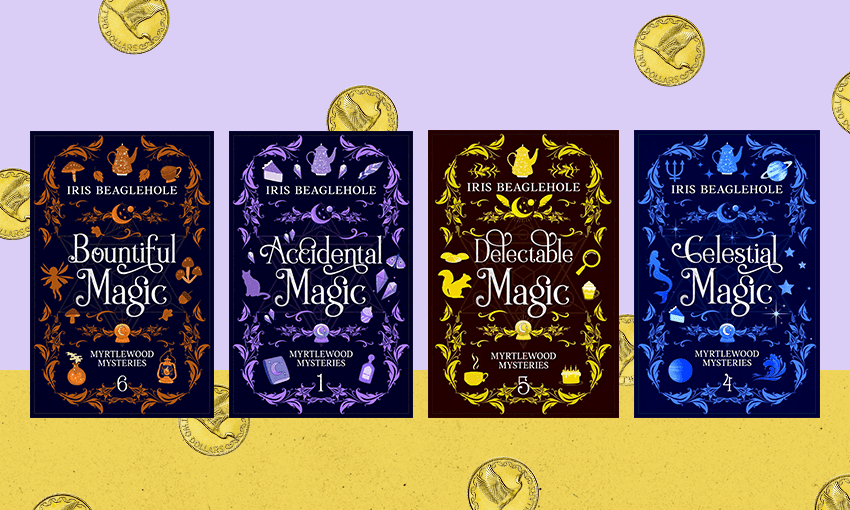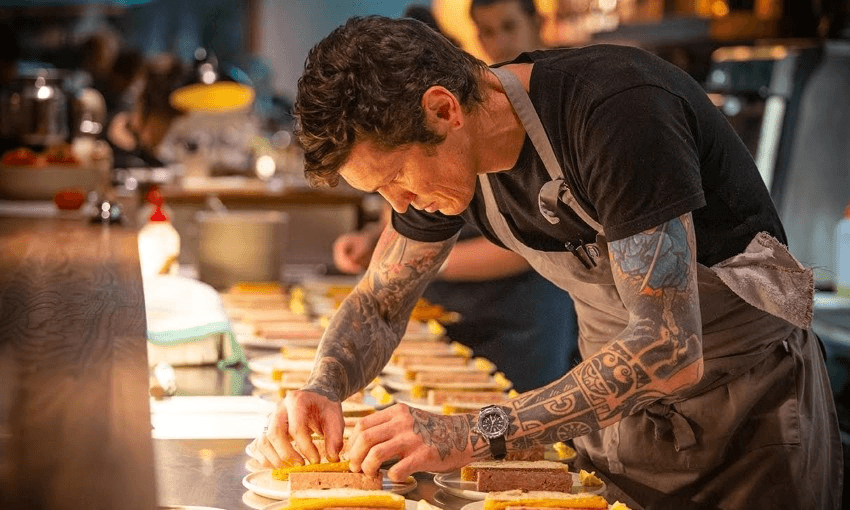Earlier this year, analysis of Google search data around job types revealed that the number one dream job for New Zealanders is to be a writer. Writer Isa Pearl Ritchie is living this dream – this is the story of her journey to get there.
Just a few weeks ago, I updated my LinkedIn from “Principal Policy Advisor” to “Novelist”. For many, this is a dream, isn’t it? For years, I convinced myself that I didn’t genuinely aspire to be a full-time writer. Perhaps I was fearful of the idea. I was a university student for over a decade, and subsequently, I embarked on a career in policy — a pretty good choice for someone who enjoys writing.
I’ve been writing from the time I learned how to, which admittedly took me longer than most. I’ve been working on novels all my adult life. Early on, each book would take years, but more recently, I’ve learned how to write quickly which is a skillset I’ve found very useful.
My early novels were more on the literary side of “women’s fiction”. They were time-consuming because I had to get into the heads of all the characters, who changed with each book. However, my first love was fantasy. I grew up reading Goosebumps books and Tolkien, but certain influences (my brilliant grandmother was a huge influence on me, but couldn’t stand the supernatural, so I refrained) led me to less fantastical storytelling. It took me years to give myself permission to write more otherworldly books. In 2018, I got an idea for a lucid-dreaming fantasy book I needed to write, and from then on I’ve predominantly written speculative fiction.
During this period, I stumbled upon online groups that advocated writing at least four books a year. Four books a year! I was outraged, and probably a bit snobby in my reaction – how awful to reduce a complex creative artform down to some kind of production line. Although I was initially appalled by the idea, as I read more and more stories of people making careers out of writing, my outrage turned to inspiration and I started to question whether it was possible for me. I got curious. I did a lot of research. Indie publishing became a special interest of mine and every time I saw a mind-blowing success story I looked for clues as to how it could be done. I read lots of craft books including on how to write faster, and though at first it seemed impossible, I continued to do the mindset work – getting my head around the idea that it could happen and that I could make it happen.
The more I learned, the less appealing traditional publishing looked to me. I relished the control and speed at which I could create and publish books that I wanted to write, working towards making a good income that seems far more reliable to me than the experiences of successful trad writers. The last shreds of shame about not being “chosen” or special enough to be picked up by a big traditional publisher burned away as I forged my own career on my own terms. Now, instead of feeling self-conscious about self-publishing, I feel extremely proud. Past-me would be astounded to know that I just published the eighth book in a successful series and that I made more money in the last month than my annual salary as a junior policy analyst!
I can only write books I’m very interested and invested in. My ADHD brain won’t have it any other way. I struggled a lot with the idea of “writing to market” which is often bandied about among these online groups. The concept initially seemed as appealing as a cold cup of tea on a winter’s day, a sell-out in the worst sense. Besides, I really couldn’t focus on writing a whole book just because it was a popular genre. But the more I researched, and read widely, the more I realised why certain kinds of books become so popular. There’s a reason why witches, vampires and werewolves keep coming back. There’s a reason why crime-readers can’t help but turn to the next page, and romance only works well if it follows particular rules and beats. Tropes feed readers. It became easier to figure out my niche once I started to understand that to be successful I didn’t need to churn out generic books, I could just work with the tropes I love. I did extensive research, which involved reading a plethora of fun books. I experimented with different pen names while I learned to write faster.
Making a living as a writer is tough. That’s what almost every writer will tell you. From the outside, people sometimes assume that writers make plenty of money because books are so expensive, but most writers are lucky if they get more than two dollars from a single sale. I’m not “traditionally published” – other than through recent audiobooks. In the past I’ve sent manuscripts to publishers but never quite hit what they were looking for at the time. It’s a tough industry. I think we’ve moved beyond weird hang-ups and discrimination against self-publishing now so I stand here with no shame as I say I am my own publisher – an indie author. Instead of continuing the submissions game I stopped looking for someone to put me on a pedestal and set up my own imprint. I contracted out design, editing and publicity, but that alone didn’t make money. The books I wrote and published in New Zealand have only made a small profit. It’s a tiny market, and while going through my wonderful distributor was brilliant for getting my books into bookshops and libraries, it wasn’t a viable income source.
I started looking at what indie authors were doing globally, and made a bunch of friends in New Zealand who are killing it as indie authors (AJ Lancaster, Katherine Hayton and Steffanie Holmes to name a few) – the majority of their income always comes from overseas. I shook off my learned-snobbery about “genre fiction” and instead turned to curiosity. Why do some books do so well? What makes some authors successful, especially when they’re doing their own publishing? The golden geese of global publishing are impossible to follow – even the biggest publishers don’t know what makes a book successful. Only one in ten traditionally published books makes a profit and they rely on that success to offset the rest.
The successful indie authors I know were (and still are) writing things that they love – and that readers were starving for. When you hear “write to market” as advice, it doesn’t necessarily mean write the same thing that others are writing, it can also mean figure out what readers are craving. What emotional “iddy” subconscious needs are books meeting for them? For example, people read scary books because they love the adrenaline, and romance because they want to enjoy all those good infatuation feelings. People love or hate particular tropes, but they only become tropes if they’re meeting some kind of psychological need.
If I was to give any advice to writers wanting to make a living from their books it would be to write a big list of all the things you LOVE in fiction, is it rooftop scenes, gritty crime scenes or amazingly descriptive magical food? Is it slow-burn romance or enemies to lovers? What TV shows do you want to watch over and over again and why? From this list, figure out how what you want to write overlaps with what people are desperate to read more of – look at the bestsellers lists, read as omnivorously as possible, think about your “why” – why do you write? What needs are you trying to meet for yourself? And then find a niche between the things you absolutely love and the things many thousands of readers are craving. I’m not going to teach people how to rock self-publishing because plenty of other authors do that, like my friend Steff Green who has a book and courses on exactly that topic.
At the beginning of 2022, I launched a new series under the pen name Iris Beaglehole, my grandmother’s maiden name. One of my writer friends had suggested it would be a fitting pseudonym for cosy mysteries. What I was writing was somewhat similar, but with a heavy dose of magic, mythology, and seasonal festivals. It took me about a year to publish the first book, but by then I’d drafted the first three books in the series.
Writing a series can be quicker since you don’t need to familiarise yourself with entirely new characters and setting every time. It’s one of the series’ perks, as a writer, you can check in on how characters are progressing, and weave initial connections into a story. Each book in my Myrtlewood Mystery series is based around a different seasonal festival, like the equinoxes and solstices. This setup allowed me to brainstorm everything that interested me in relation to each festival, and then a plot would generally organically emerge, because I’m not great at following instructions, even my own.
I was able to launch and promote my books in a way that attracted a large number of readers who were as excited about the books as I was. The catchphrase, “Gilmore Girls meets Practical Magic/Buffy/Charmed,” did wonders in drawing readers in. After a few months, I started to earn a decent income, rivalling my full-time salary. I invested initially in the series like a business and after the first few months I managed to keep my promotional costs under or around 30% of total revenue.
The beauty of a series is that readers will read through from the first book, which often acts as a sort of loss leader. The more books you have, the more profitable the series becomes, as long as people are excited enough to continue reading through. About halfway through 2022, with my books doing so well, I decided to transition from my permanent role to contracting because the flexibility would offer more time to write. I had one six-month contract at the end of 2022, and took the summer off to write more.
I didn’t initially want to be a full-time writer because I wanted to do meaningful work in the policy space, but, this year, faced with the option of picking up a new role and having my time condensed to regular working expectations when my books were doing so well wasn’t so appealing. Besides, I don’t like being told what to do and I get easily frustrated by the risk-adverse trappings of bureaucracy, making me increasingly unemployable. Don’t get me wrong. I loved my policy work. I was passionate about influencing social policy to work better for whānau and communities, and I still am, but I’m heartened to know that there are a lot of good people in the public service doing their best to make things better.
Delving deeper into my “why” – and what makes work meaningful for me. My books are. They might seem silly, but for me, they also contain the values and drives that I find important. The characters heal and uncover mysteries within themselves as they develop. They are unapologetically spiritual without constraints from any particular religion. The experience my readers report is often laced with meaning, self-discovery and fun – and who doesn’t need more of that in their lives right now. I’ve had readers send personal messages, thanking me for writing books which have helped them get through incredibly hard times in their lives … it’s genuine magic.
This newfound freedom to write full-time was initially strange, and I had to confront a lot of childhood money scarcity and anxieties. At the start of 2023, I began looking for another contract, but soon realised that the time I had was better spent focusing on my books. The more attention I gave to my emotional needs and to the books themselves, the more they seemed to soar. They began earning considerably more than my job had paid. My writing income quadrupled over the past four months. This month, my income before expenses will be over $50,000NZD – FOR THE MONTH. I’m still getting my head around this outrageous figure.
I had to re-programme my brain to understand that I didn’t have to be in traditional employment. I’m working for myself and my own book business. A few months ago, during an email conversation with another popular cosy mystery writer, she mentioned that we run multinational publishing companies. She wasn’t wrong. Most of my readers are in the US and the UK, which is where most of my promotional budget is directed. I contract out editing and design services, and have a part time author PA (personal assistant) who lives in the US and makes some of my social media content and writes my newsletter.
Now, I’ve written more than 20 books. Although most of them didn’t make much money, if any. The success of my new series can largely be attributed to the sweet spot where my excitement for the subject matter overlapped with a large hungry audience who were also excited about the same themes. My books are meaningful to me (otherwise they wouldn’t hold my attention). I love drawing on genuinely witchy elements, and my readers seem to love it too. I enjoy posting amusing memes on my Facebook page, spreading magic and joy as much as possible.
I find it a little hard to believe that I’m living a life where I have control over my time, making substantial income from my books, and I’m not at the mercy of a big publishing company that may or may not like what I write next. Yes, I am running a business, which took me a long time to accept because it seemed so… erm… capitalist. I was initially so resistant to that idea – and so terrified of tax – that I didn’t really want to make money from my books for years. Now, I have an accountant to figure out the tax and I quite enjoy the business side of things – looking at graphs and making decisions about where to invest promotional money. I love the dopamine released when my graphs track upward. But more importantly, I’m spending my time creating in a way that is meaningful to me, and sharing that with thousands of readers who get joy, satisfaction, and meaningful experiences from my books.
My books aren’t highbrow or fancy; they are like nourishing comfort food – relaxing, fun, a bit silly – but they’re also spiritual (in a witchy way) with plenty of character development, and most importantly, they’re incredibly enjoyable to write. So, as long as there’s a story to tell, I plan on living this dream indefinitely.
You can find out more about, and order, Isa’s Iris Beaglehole books here, and find out more about Isa’s other books here.





















Discussion about this post